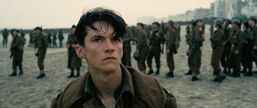"Dunkirk" itself is a historical term, and there is pearl and jade in front; it is like the Chinese people listen to "Four Crossings of Chishui", the result already knows, there is no suspense. A hard shot based on historical facts becomes a science and education documentary.
Nolan naturally understood.
So he thought of a way to keep the suspense, that is:
This film is not so much a war film as it is a suspense film.
We know that the 400,000 Anglo-French coalition forces in history successfully withdrew 330,000 people. We know that this retreat saved Europe to some extent, preserved the fire on the western front of World War II, and saved Britain and France to some extent. There is no suspense about the magnificent result.
So Nolan let us look at the protagonist of the individual, and let us worry: the large force is withdrawn, what about them? What about the fate of individuals in war ?
Very subtle: the legendary figures like Hitler, Churchill and De Gaulle do not appear in this film.
What's more interesting is that there is basically no specific German soldier —there are German planes, German bullets, and the infamous group portrait of German soldiers at the end of the film, but no specific German soldier appears. They are more like potential, invisible threats.
So the movie was extremely simplified. Invisible enemies are coming. On the coast are Anglo-French soldiers, looking at Britain in the north. Everyone is discussing one word, "home". Cross the sea and you can go home.
Of course, it's still across the sea.
So this movie was simplified to, "Before the enemy arrives, we have to go home across the sea."
So it became a story about the individual.
The air force is fighting hard. The ships at sea risked their lives to rescue. The soldiers on the coast were nervous and hesitating. Hans Zimmer's music resounds throughout, with a lot of bronze sound effects with a compact mood. Emotions are always tense.
There are three emotional bursts. First, the British fleet appeared. Second, "I want to leave for the French"-this sentence must have an impression. The third is the end.
But most of the time, emotions are stretched and restrained .
And the ups and downs of emotions dominate the process of the film. The British yelled at the people who came in out of fear on the ship; the panic of the sailor; the pilot silently calculating the oil; the old British ship owner was as calm as a god.
Especially the suspected civil unrest of the British reminds me of the threat of bombing the ship in "The Dark Knight" and the moment of disputing whether to retreat in "Assembly"-when human nature is extremely tense, when emotions are gradually disintegrating The details are very interesting.
Of course, there is no classic Nolan character like the Joker and Xiao Li. But this one didn't emphasize individuality—the air, the shore, and the sea. These characters mainly emphasized the commonality of the group. After all, they condensed the fear of the 400,000 army.
One thing reminds me of "Gravity".
In "Gravity", the universe is vast, beautiful and cruel; in the same way, in "Dunkirk", the German army does not actually appear, and the sea is the real protagonist. The sea was photographed extremely beautifully by Nolan. There is a monotonous magnificence, enough to reflect the weakness of human beings, blocking the hope of survival, and swallowing life at any time, just like the ruthless universe; but the sea is the way home— —As long as the owner of the ship, the old aristocratic fan of the British Empire is supporting.
This beautiful and cruel contradiction, hey.
There is no typical heroic image, except perhaps the chief who "I want to stay for the French", the old man who is driving the boat, and the pilot. The chief’s responsibility when he lost his way; the owner of the ship was determined from the beginning, driving a private boat, like an outing, to come to the war-torn coast to rescue people, and to soothe the souls of the soldiers who fell into the water; the pilot completed the mission without hesitation , Lit that cluster of flames on the coast.
Most of the other characters are just a bunch of people. The long wait, the boundless sea, was finally saved by some kind of persistence-I don't believe that Nolan has no metaphors.
After a long period of restraint for an entire movie, there is a close-up of a peaceful moment. The blue tones of the sea are replaced with warm gold tones. Then in the constant interspersed footage, the famous speech appeared.
I have seen it many, many times before, but in the cinema, only this time, I was convinced. I think Winston Churchill deserves all his praise with this passage.
After all, this movie is like a supporting commentary specially made for Churchill's passage:
We will fight to the end. We will fight in France, we will fight in the sea and the ocean, we will have increasing confidence and strength to fight in the air; we will defend our islands at any cost. We will fight on the beach; we will fight on the enemy’s landing site; we will fight in the fields and the streets; we will fight in the mountains; we will never surrender . Even if this island or most of it is conquered and hungry, this is something I haven’t believed for a minute. Our imperial subjects overseas must continue to fight under the protection of the British fleet until the new world. Use all its power and abilities to save and liberate this old world when God thinks it is appropriate.
When this passage is stated, the camera keeps turning to the beach, to the landing point, to the island and all locations, to all the characters who sacrificed and survived, and to the sea.
"We will never surrender...until the new world uses all its power and abilities when God thinks it is appropriate to save and liberate this old world."
Nolan is so suspenseful about the fate of the little man. What he wants to discuss is not a grand war, but " the emotions and destiny of each individual in the war."
He probably wants us to believe:
Before the overwhelming events and the grandeur of the sea, the fear and helplessness of small individuals are inevitable; but certain noble moments of bravery, certain small individuals' actions (such as the continued silence of the old shipowner) can appear more Great; in the end, these sacrifices will be worthwhile.
——At least I believe so.
View more about Dunkirk reviews











